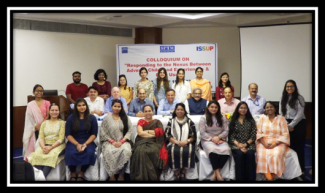Report: Colloquium on “Responding to the nexus between adverse childhood experiences and drug use”

A colloquium on “Responding to the Nexus between Adverse Childhood Experiences and Drug Use” was held on April 15, 2023 in New Delhi, attended by 40+ participants. The colloquium was hosted and organised by the Society for Promotion of Youth and Masses (SPYM) with the support of International Society of Substance Use Professionals (ISSUP) and Paul Hamlyn Foundation (PHF).
The colloquium provided an interactive platform to various luminaries and experts to share their views on the existing issue of drug use amongst children, the impact and reasons. Research has shown that adverse childhood experiences (ACE) disrupt crucial normal stages of childhood development. Traumatic events that can occur from early childhood, including adolescence, can have wide-ranging consequences that can have long-lasting affects that can endure even throughout adulthood. ACE can result in higher risk of emotional and interpersonal difficulties that may lead to greater likelihood of seeking easily available drugs, both licit and illicit.
Professor Anju Dhawan National Drug Dependence Treatment Centre, AIIMS, Delhi outlined the Situation of Substance Use in Children in India. There was strong evidence of an increasing problem of substance use among children and adolescents. Data from a Ten City (India) Student Survey (around 6000 students) 2019-2020, found that ‘ever having used a substance’, 1 in 7 students (15%) had done so, and in the past 12 months 1 in 10 students (10%) had engaged in substance use. For the past month, substance use was 1 in 14 students (7%). The number of children using substances was 2-3 times higher than calculated based on the National Survey for most substances. A key response will be the need to introduce various prevention and early interventions to match the scale of substance use among children and adolescents.
Gary Reid, Technical Advisor, SPYM, presented findings from a survey of 80 children from three drug rehabilitation centres in Delhi examining issues of past ACE. The study found > 60%+ had experienced humiliation/insults, violence, lack of love, domestic violence against mother/step mother and family drug use. Positive life experiences were often constrained, and a sizeable number of children had engaged in self- harm. V Kalyani, consultant with SPYM, outlined a school education programme called “NAVCHETNA” adopted by Ministry of Social Justice and Empowerment to impart life skills and receive drug education about various substances. Feedback of the presentations was provided by Justice (Ms.) Mukta Gupta, Chairperson, Juvenile Justice Committees (JJC), Hon’ble High Court of Delhi and Mr. Marco Teixeira, Regional Representative, Regional Office for South Asia, UNODC. In line with the information presented, participants were split into four working groups, provided with specific topics to discuss and proceed to identify gaps and/or provide suggestions and solutions. The colloquium highlighted the scale and gravity of substance use among children in India, the extent of ACE among a select group of children affected by drug use at SPYM drug treatment centres, and highlighted the need for greater awareness and sensitization of the issues through a multi-sector approach.